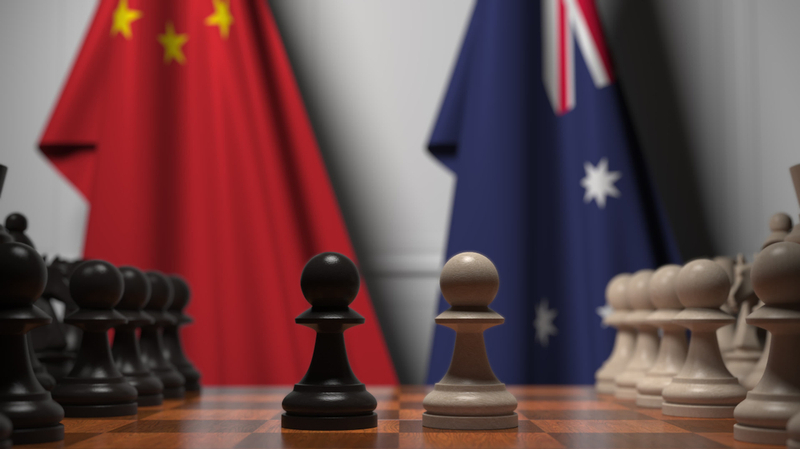The temperature’s rising
September 23 2020

Note: This article appeared in AK NewsMagazine on September 23 2020.
The deterioration of Australia-China relations fast-forwarded following Australia’s first-out-the-gate solo call for an independent, international inquiry into the origin and spread of the COVID-19 pandemic earlier this year. Initially in an uneasy holding pattern following the ratcheting up of tensions in 2017, both countries now seem to be engaged in a veritable race to the bottom.
Over the course of the last few months, the news cycle has been awash with development after acrimonious development. The Australian government has adopted hard-line stances and policies on various fronts, some which might have elided specific reference to China, but all clearly directed towards addressing China-related concerns. These include proposed legislation to review, and terminate, any existing and prospective arrangements between states and territories and all foreign governments; the announcement of an inquiry into foreign interference in Australian universities; hardening messaging on the South China Sea; the suspension of an extradition treaty with Hong Kong following the enactment of controversial national security legislation; reported raids on the homes of Chinese journalists in Australia; and the rejection of a proposed $600 million acquisition by Chinese-owned Mengniu Dairy company of the Japanese-owned, Australia-based Lion Dairy and Drinks, the second largest milk processor in Australia. Most recently, a Chinese consul was named as a person of interest in an Australian security and intelligence investigation into foreign interference.
China, for its part, opted to match each perceived slight with retaliatory measures of its own, relying primarily on pulling economic levers, such as the imposition of tariffs on Australian barley; a ban on imports from a fifth major Australian meat processor; the commencement of an anti-dumping investigation into Australian wine and warnings issued to Chinese students and tourists against studying in and visiting Australia. Most concerningly, Chinese authorities in August arrested an Australian anchor for CGTN, a Chinese state broadcaster, supposedly on national security grounds. Coupled with the arrest at the beginning of last year of another Australian citizen on similar charges, this seems to point to the emergence of an unsettling trend of using arbitrary detention to communicate political dissatisfaction. Its security agencies had also set their sights on Australia’s last two accredited journalists this month, forcing them out of the country.
While both Australian and Chinese governments have obfuscated in terms of publically linking these moves to political tensions, lines of engagement are being emphatically redrawn.
Canberra has sent a forceful message to Beijing: that it objects to its increasingly assertive foreign policy, particularly in terms of the manner in which it has negatively impacted Australian interests. And in parallel there seems to be the start of a shift in tone amongst Australian industries on the receiving end of Beijing’s trade-focused punishment. The head of the Western Australian Farmers’ Federation articulated it thusly, 'Squeeze a piglet, make it squeal and the big sow will come running…the industry is getting better at not responding because that’s what China wants.'
Indeed, other like-minded nations seem to be contemplating firmer stances on China, most recently evinced by the tense EU-China leaders’ summit on September 14.
While the Australian experience is an instructive one in terms of taking on a principled – to some extent – stand predicated on the non-negotiability of sovereignty, it might have been more pragmatic if Australia had thought out a more cohesive approach rather than engaging in shoot-from-the-hip improvisation. Substantial portions of Australian China policy have seemed to be made on the fly. To be sure, this has been spurred on predominantly by the character Beijing has assumed under President Xi Jinping, and a growing frustration at China’s recalcitrance on numerous fronts, expecting obedience rather than making any concerted attempt to engage in negotiation. But there also seems to be a distinct lack of core guiding strategy, let alone a coherent roadmap of how fallout might be managed. There has, too, been an increasing intrusion of domestic politics into foreign policy which is never a particularly useful exercise.
There remains the unfortunate potential for the relationship to continue to worsen. Both countries have more to gain by scaling down the toxic atmosphere, which is – and will continue to be – mutually destructive. In moving towards de-escalation, the Australian government ostensibly needs a better, clearer and more effective strategy on China. Seeking and highlighting areas of convergence, placing a higher premium on enunciating, elevating and pursuing themes for potential cooperation, could be initial steps in winding back the relationship to more cordial times. People-to-people ties also cannot be left to drift. At the same time, de-escalation is necessarily a two-way street. The Chinese government will need to themselves adjust and exhibit a willingness to pursue compromise, the first step towards which is dialogue – thus far senior ministers seem to be unwilling to even receive calls from their Australian counterparts. Without doing so China risks continuing its march down a solitary path of alienation, diminishing other countries' appetite for engagement with it.
Elena Collinson is a senior researcher at the Australia-China Relations Institute, University of Technology Sydney.

